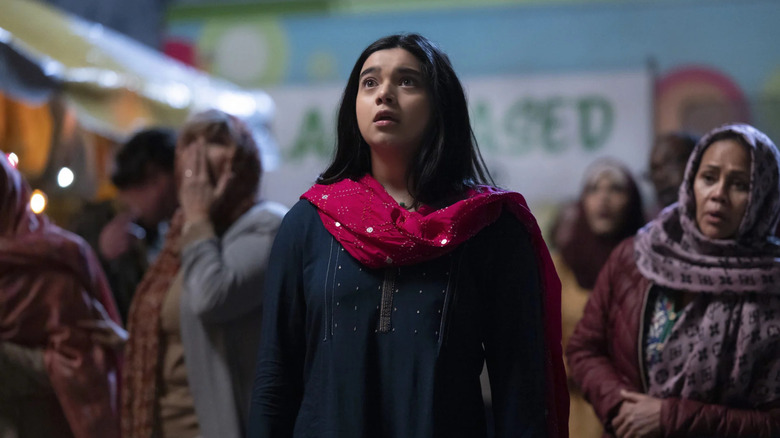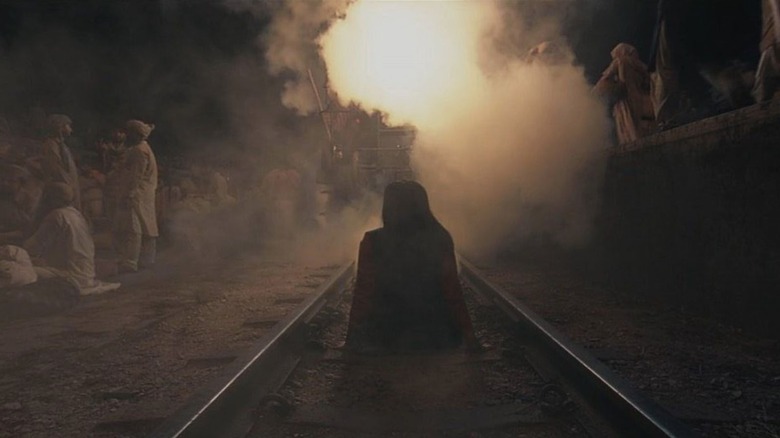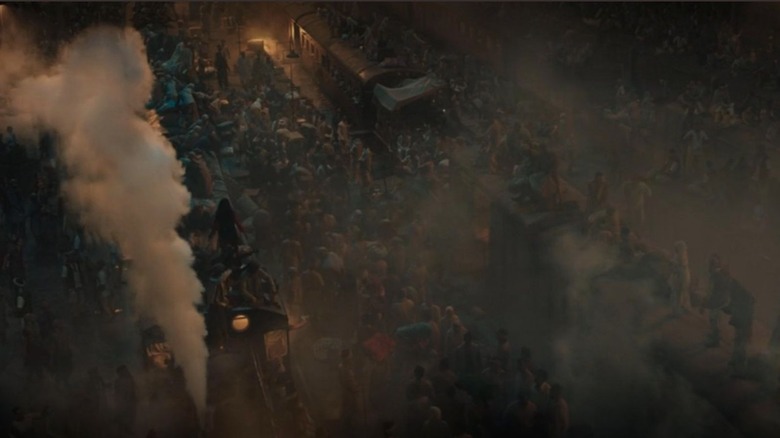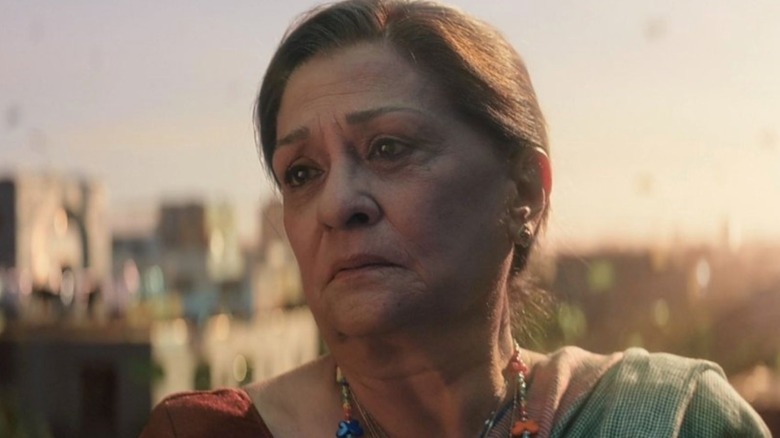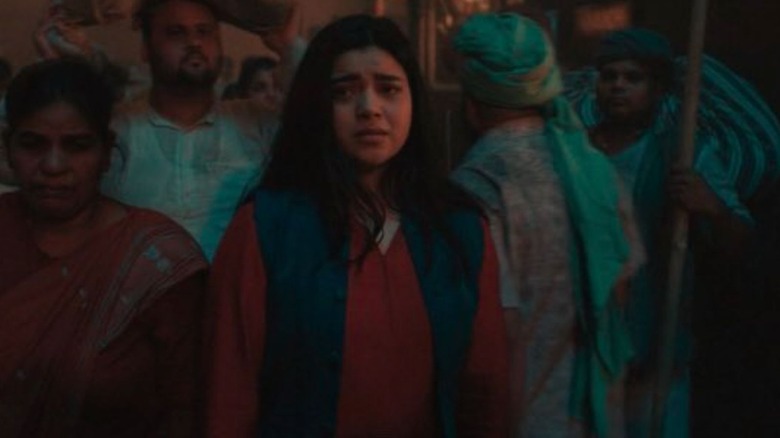Why Ms. Marvel's Depiction Of The Partition Of India Is So Important
Note: Spoilers for Ms. Marvel episode 4 below.
The Marvel Cinematic Universe is the world's biggest comic book movie franchise. With its roots in Hollywood and its capacity to reach out to millions of viewers from different backgrounds across the world, lately, the MCU has been pretty terrific in exploring the stories of superheroes from marginalized backgrounds, with its newest entrant being Kamala Khan (Iman Vellani), a Pakistani-American Muslim teenager from New Jersey.
Unlike any of its superhero properties that came before, "Ms. Marvel" is steadfast in its resolution to illustrate a Brown Muslim girl's experiences by focusing on her faith, culture, and the traditions stemming from said culture. Kamala's life is unapologetically, lovingly, centered around her culture. Representation in Western media for people of marginalized communities has been glaringly non-existent, but "Ms. Marvel" has altered that truth in unimaginable ways.
Not only does "Ms. Marvel" sensitively depict the experiences of growing up as a Muslim teen in a majorly non-Muslim community, but it also untangles the atrocities embedded in Kamala's origin story: the terrors of the Partition of India that affected her family, leaving an enduring impression over their lives. In the first episode of the six-part series, the Partition of India is discussed over dinner. In the fourth, "Ms. Marvel" displays an entire scene dedicated towards the grief, the anguish, and the unthinkable fear every living person on Indian soil experienced, and the question that would dictate their lives forever — to stay or to leave. Not only does the Disney+ series showcase this harrowing sequence with nuance and understanding, but it makes a genuine effort to make it realistic while giving it the screen time it deserves. The Partition of India had lasting effects — many that are felt to this day — and it's incredible to see Western media finally paying attention.
The MCU's nuanced depiction of the Partition of India
The ending moments of "Ms. Marvel" episode 4 are a punch to the gut for many South Asian viewers, especially those from Indian, Pakistani, and Bangladeshi backgrounds. We see friends hug each other goodbye. An aging father reassures his son that he should leave without him. A young girl asks her mother if there will be a place for them. Cloth bags hold a lifetime's worth of possessions. And just when it becomes too brutal to watch, there's an aerial view of a train station that is teeming with more people than trains can ever harbor, with some clamoring to climb to the top, some standing by to etch one last glimpse of their loves ones into memory. Others remain stranded, all while the steam engines roar, threatening to leave millions behind.
This isn't a fictionalized story fabricated to serve a narrative — but a reality experienced by millions of South Asian people. The British colonization of India began in 1757 following the Battle of Plassey and lasted nearly 200 years until India's liberation from the British Raj in 1947. The British rule culminated in bloodshed, unimaginable violence, and what is widely known as one of the most significant refugee crises in history. Soon after independence from the Crown, India was divided into two independent nation-states: a Hindu-majority India and a Muslim-majority Pakistan. Communal violence ensued, and people belonging to the two communities were driven to escape to regions that protected them based on their religious identity. It didn't end there; the undying tension between newly-independent India and Pakistan led to warfare, border altercations, and military stand-offs. The Partition continued to impact the two countries, and in 1971, the secession of East Pakistan formed the independent state of Bangladesh. The Partition of India uprooted millions of homes and divided families forever, causing forced displacement and long-lasting apprehension and fear. Its nightmarish depiction in "Ms. Marvel" is heartbreaking to watch.
Why the accurate depiction of the Partition is incredibly important
As an Indian Muslim viewer, I must admit that "Ms. Marvel" has surprised me with every episode. Head writer Bisha K. Ali is no stranger to Kamala's experiences, and Oscar-winning director Sharmeen Obaid-Chinoy's vision in portraying the darkest chapter in the history of India and Pakistan is evidence that we must trust South Asian people to tell their stories. It's already tremendous for a mainstream television show out of the U.S. to recreate the horrors of India and Pakistan's past, but to do so, so thoughtfully, in a profoundly authentic manner is a big win for representation.
The Partition of India has been previously depicted in several films based in India and Pakistan — but to see the Hollywood silver screen paying attention is significant. The historical event greatly influences Kamala's origin story as a superhero and crafts an identity for her family — her mother Muneeba left Pakistan to escape the shadows of her mother's dark past, but she still has her memories. The Partition is an incident ingrained into her life. And in the upcoming final episodes, we'll witness just how much its consequences tie into Kamala's powers.
Specificity is representation
As Iman Vellani rightly said, "specificity is representation," and not when you generalize the world's nearly two billion Muslim population into one "best friend" character. Kamala Khan is an Avengers superfan — she's a teenager learning to survive high school, she's bearing the burden of her family's generational trauma, and trying to make sense of herself in a world that can't even say her name right. At the end of the day, she just wants to make YouTube videos and go to comic conventions for superhero nerds.
Her experiences as a Muslim, Pakistani-American teenager elevate her story — they don't make it her entire personality. Kamala's complex family origins are why she struggles with her own identity. The Partition of India will continue to play a pivotal role in Kamala's story because, in many ways, it has led her to where she is today.
A huge win for representation
"My passport is Pakistani, and my roots are Indian. And in between is a border built with blood and pain. People are claiming their identity based on an idea some old Englishmen had," Kamala's Nani, Sana, tells her in episode 4. This upheaval, loss of identity, and her inability to move forward showcase the long-lasting outcomes of a historical event that transformed the lives of millions, perpetually changing them for better or worse.
Whether Kamala has been transported back in time or is having a vision of the night her great-grandmother was lost forever at the train station is yet to be seen. But "Ms. Marvel," in just a few minutes, has provided an opportunity for its viewers to educate themselves about a noteworthy historical event that has rarely had a place in Western media. While, as a South Asian viewer myself, I would implore you to learn about the Partition from other academic resources, it's no small feat for "Ms. Marvel" to show an event of such significance, with such unshakeable honesty, in a mainstream television show. This is a powerful first step towards proper representation, one that I hope to see more of going forward.
